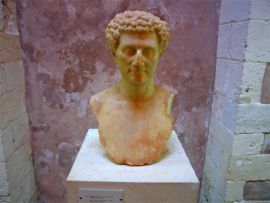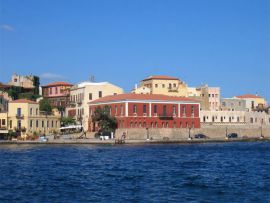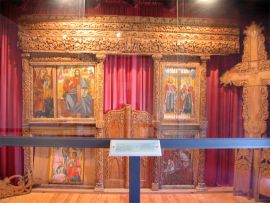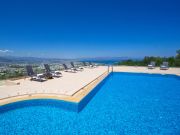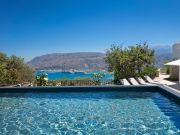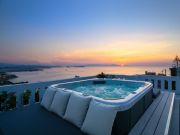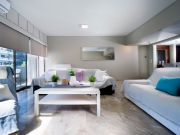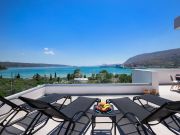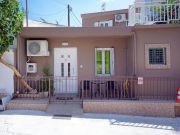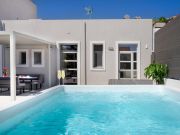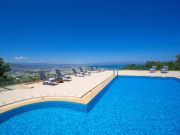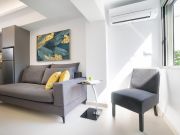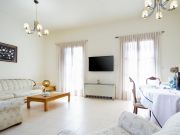-
Archaelogical Museum
 The Archaelogical Museum of Chania is located on Halidon street, opposite of the church of the Three Martyrs, in the Venetian church of Agios Frangiskos. It is housed in the former temple (katholikon) of the medieval Franciscan monastery, one of the most important monuments of the Venetian period in Crete (1211-1669). During the period of the Ottoman occupation, the building was converted into a mosque. Its operation as a museum was established in 1963.
The Archaelogical Museum of Chania is located on Halidon street, opposite of the church of the Three Martyrs, in the Venetian church of Agios Frangiskos. It is housed in the former temple (katholikon) of the medieval Franciscan monastery, one of the most important monuments of the Venetian period in Crete (1211-1669). During the period of the Ottoman occupation, the building was converted into a mosque. Its operation as a museum was established in 1963.
The museum galleries host antiquities recovered from the city of Chania and the wider region of west Crete, which cover a time span from the Neolithic to the Roman periods (4th millenium BC - 3rd century AD), presenting a diachronical picture of the historical and cultural evolution of the area.
In the museum it is exhibited the history of the city and prefecture from the Neolithic age to Roman times. In the east section of the basilica there are displayed objects from prehistoric and Minoan times, whereas in the west section there are displayed objects and collections from historical times.
-
Naval Museum
 The Naval Museum of Chania was founded in 1973 and it is housed in the entrance of the Firkas Fortress in the Venetian harbour. There are exhibited models of ancient and modern ships, navigation equipment, naval mementos of the Greek Wars and even a collection of rare shells, and paintings.
The Naval Museum of Chania was founded in 1973 and it is housed in the entrance of the Firkas Fortress in the Venetian harbour. There are exhibited models of ancient and modern ships, navigation equipment, naval mementos of the Greek Wars and even a collection of rare shells, and paintings.
Moreover, there are portaits, and authentic historic photos, such as the raising of the flag of the Union of Crete with Greece in the Firka fortress at Chania, on the 1st December 1913. There is also a detailed Marquette of Chania like it was in the 17th century, together with the port and the Venetian dockyard.
The Naval Museum is open daily from 09:00 to 16:00 during the summer (1/4 to 31/10), otherwise it is open from 09:00 to 14:00 (from 1/11 to 31/3).
-
War Museum
The War Museum of Chania It is located next to the Municipal Gardens. The collection exhibits photographs, mementos and guns from the most important wars in which the Cretians took part in the 20th century.
-
Byzantine and post-Byzantine Collection
 The Collection shows the historical and artistic personality of the county of Chania during Byzantine and post-Byzantine times. It is hosted in the Church of San Salvatore, which is built on the west side of the fortress of Chania. There are many lovely exhibits such as mosaics, wall-paintings, icons, architectural sculptures, ceramics, items of minor arts, and coins.
The Collection shows the historical and artistic personality of the county of Chania during Byzantine and post-Byzantine times. It is hosted in the Church of San Salvatore, which is built on the west side of the fortress of Chania. There are many lovely exhibits such as mosaics, wall-paintings, icons, architectural sculptures, ceramics, items of minor arts, and coins.
The Byzantine and post-Byzantine Collection is open from 18:30 to 15:00, except Monday
-
Folklore Museum, Chania
The Folklore Museum of the town of Chania is located on Halidon Street, on a small courtyard opposite the church of the Three Martyrs, next to the Catholic Church. Here you can get a representative picture of the way of life during the 20th century in Crete.
The exhibition includes collection of tools, raw materials and products of traditional domestic handicraft, various crafts and agricultural life. Secondly it includes presentations of agricultural occupations, domestic handicrafts and various crafts like shoemaking, basket-making etc. Finally it is presented the interior of an agricultural, traditional house.
The Foklore Museum of Chania is open every day from 09:00 to 15:00 and from 18:00 to 21:00. It is closed on Sundays and in public holidays.
-
Historical and Folklore Museum, Gavalochori
 The Historical and Folklore Museum of Gavalochori is located in the traditional village of Gavalochori, in the Apokoronas area. It is housed in a lovely renovated Venetian building with Turkish additions; the main architectural characteristic is the arches that divide the ground floor to different rooms. In the museum you can get a representative picture of the way of life during the 20th century in the traditional (most) villages of Crete.
The Historical and Folklore Museum of Gavalochori is located in the traditional village of Gavalochori, in the Apokoronas area. It is housed in a lovely renovated Venetian building with Turkish additions; the main architectural characteristic is the arches that divide the ground floor to different rooms. In the museum you can get a representative picture of the way of life during the 20th century in the traditional (most) villages of Crete.
The exhibition is well labelled in English and it includes examples of pottery, weaving, stonecutting and silk lace. There are also documents related to the wars of the Cretans for freedom. The Folklore Museum of Gavalochori is open daily from 9am to 8pm, Saturdays from 9am to 7pm and Sundays from 10am to 1.30pm and 5pm to 8pm.



